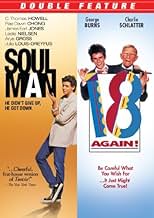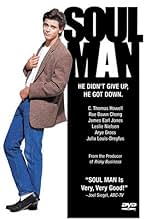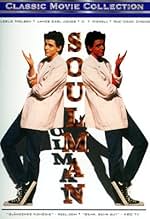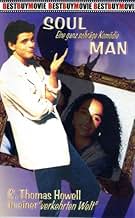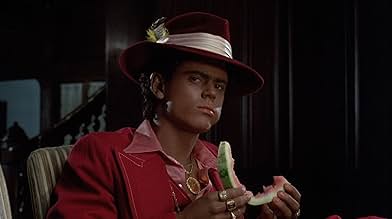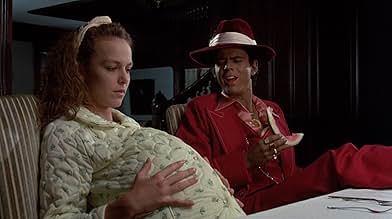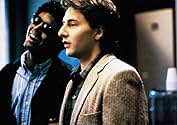AVALIAÇÃO DA IMDb
5,3/10
9,6 mil
SUA AVALIAÇÃO
Adicionar um enredo no seu idiomaTo achieve his dream of attending Harvard, a pampered teen poses as a young black man to receive a full scholarship.To achieve his dream of attending Harvard, a pampered teen poses as a young black man to receive a full scholarship.To achieve his dream of attending Harvard, a pampered teen poses as a young black man to receive a full scholarship.
James Sikking
- Bill Watson
- (as James B. Sikking)
Maree Cheatham
- Mrs. Dorothy Watson
- (as Marie Cheatham)
Wallace Langham
- Barky Brewer
- (as Wally Ward)
David Reynolds
- Ernie
- (as Dave Reynolds)
Avaliações em destaque
Ridiculously unfunny 80s switcheroo comedy about a teenager named Mark (C. Thomas Howell) who desperately needs a scholarship to get into Harvard - the only problem is, the one remaining scholarship is open only to blacks. You can guess Mark's brilliant plan, as well as the fate of the entire movie. Funny premise and great co-stars (James Earl Jones, Leslie Nielsen, Julia Louis-Dreyfus) cannot a good movie make. Jokes are wasted and the film is way too predictable.
** / *****
** / *****
"to what?"
"frankly, your tone of voice."
i watched soul man twice at the cinema when it came out; i loved it to bits.
i thought the movie was warm and funny and dealt with a difficult subject in an imaginative and sincere way.
i found c thomas very likeable and i thought his relationship with rae dawn chong and her young son was believable and natural. james earl jones was fantastic too.
my fave thing about the movie is ayre gross. i loved him in coupe de ville and on ellen and he's excellent here as mark's smart-alec best friend gordo. the scene where he has to defend mark in court is so funny.
"frankly, your tone of voice."
i watched soul man twice at the cinema when it came out; i loved it to bits.
i thought the movie was warm and funny and dealt with a difficult subject in an imaginative and sincere way.
i found c thomas very likeable and i thought his relationship with rae dawn chong and her young son was believable and natural. james earl jones was fantastic too.
my fave thing about the movie is ayre gross. i loved him in coupe de ville and on ellen and he's excellent here as mark's smart-alec best friend gordo. the scene where he has to defend mark in court is so funny.
When I started to watch this film I thought, not another teen movie. That's not to say it wasn't funny because it was hilarious but then something happened in the film as it began to give a message of racism in American society in particular(and the world by inference). The premise that a white student could become black just by using tanning pills is so ridiculous but if you get over that funny leap in belief and you give this film your time you will be rewarded with a sentimental love story with a anti-racist message and what's more, the movie makes you think- what if I were black? Would I be treated like that just on the basis of the colour(or color as you Americans spell it) of my skin?
The main character Howell comes across as a bit of a j***k, pardon my language, at first but you see him mature with what he sees happening around him. His self importance disappears with every racist moment and we are left with not a broken man as maybe someone who had to put up with it all through their life (a Black person) but because he can go back to being seen as important in society (i.e. a white man) he is left enriched by the experience and an infinitely better person. The love angle is very well portrayed especially by two people who actually went on to get married after the movie in real life which just shows the chemistry between them on screen. The only thing after seeing this movie that I can see wrong with it is its competing ideas and themes- you are not sure what you have watched, was it a teen movie, love story, drama or anti-racist 'propaganda'. Personally as someone who likes all those types of movies I think it is the my greatest modern movie of all time. 10/10
The main character Howell comes across as a bit of a j***k, pardon my language, at first but you see him mature with what he sees happening around him. His self importance disappears with every racist moment and we are left with not a broken man as maybe someone who had to put up with it all through their life (a Black person) but because he can go back to being seen as important in society (i.e. a white man) he is left enriched by the experience and an infinitely better person. The love angle is very well portrayed especially by two people who actually went on to get married after the movie in real life which just shows the chemistry between them on screen. The only thing after seeing this movie that I can see wrong with it is its competing ideas and themes- you are not sure what you have watched, was it a teen movie, love story, drama or anti-racist 'propaganda'. Personally as someone who likes all those types of movies I think it is the my greatest modern movie of all time. 10/10
You can't talk about a movie like "Soul Man" without feeling your feet inevitably hitting a soap box. So let's get the film's controversy out of the way: Is it wrong for a white person like Mark Watson (C. Thomas Howell) to disguise himself as a black person? In most cases, yes. Is it wrong to do so to obtain a scholarship? In all cases, double yes. Does it make a bad idea for a movie? Not necessarily.
The problem with "Soul Man" is not so much its premise as much as its execution. You have a white college student, Mark, from L.A. who learns that he and his friend Gordon (Arye Gross) have been accepted into Harvard Law School. The only problem is that even though he comes from a well-to-do family, his father decides not to support him financially. Mark tries every way to pay for his tuition and living expenses, including applying for financial aid, for which he is immediately turned down. I'm not so sure if that would happen in real life, but then again, I haven't applied to law school. Plus, anyone can apply for student loans, right? Regardless, Mark eventually comes across Harvard's only viable full-ride scholarship he can find, which happens to be solely for African-American students. In a fraudulent and risky move, he decides to turn himself black. He does so by taking tanning pills that increase the melanin in his skin, and dons a Jheri curl.
There are two problems with this transformation: 1.) Howell does not look African-American at all when he darkens his skin. In fact, I thought he looked like an Indian-American with a really bad hair stylist. Yet, in this movie, no character seems to think for a second that this guy isn't black, not even Harvard Professor Banks (James Earl Jones), who seems way too educated to be fooled.
2.) Most importantly, you never actually see Mark Watson come to the conclusion that posing as a black man is a good idea. The film just suddenly jump cuts from his vain attempts to seek financial support to his racial transformation, all with no explanation whatsoever. I wanted to see him take those pills and at least get an idea of what was going through his head. Also, why did he decide on a Jheri curl as a haircut? I would imagine that a Jheri curl, which already requires an ozone-killing amount of hair spray as it is, would be more difficult to maintain than simply shaving his head. John Howard Griffin employed the latter hairstyle choice while doing research for the novel "Black Like Me".
I could go on about the character weaknesses of Mark Watson, such as the fact that he doesn't seem smart enough to mop the floors of Harvard Law School let alone be a student there, nor does he have the motivation. He made the dumb decision to attend Professor Banks' criminal law class simply because Professor Banks was "a brother". He doesn't seem to register how intimidating James Earl Jones is as a Harvard professor, whereas I got the impression immediately as Jones was taking attendance in his first scene.
It's not C. Thomas Howell's fault that the Mark Watson character is the way he is, although his career suffered because of it. It's just that Mark should have been developed more, and not just be made a carbon copy of a member of the Delta Tau Chi frat in "Animal House" (1978). If Arye Gross's character was made that way, that's fine, but making both characters inept really ruins the base of the story.
Otherwise, I actually liked the parts of the film where Mark begins to realize that racism is not something that just died after the 1960's. He does say at one point that, "This (the 1980's) is the Cosby decade! America loves black people!" Well, not so much. While racism is not as obvious as it was before the Civil Rights Movement, it's still alive and well even in liberal Massachusetts.
I liked how Howell gets fazed little by little over two white classmates who like telling racists jokes to one another. I also thought his time in jail with unruly white disgruntled baseball players was stinging enough. The basketball montage (featuring Ronald Reagan's son, Ron Reagan) was also very funny.
I thought most of the supporting actors were convincing. Rae Dawn Chong was charming as ever, although her career also fizzled after this movie for some reason. Leslie Nielsen was also good as Mr. Dunbar, a building superintendent who does not take kindly to his beautiful daughter's (Melora Hardin) attraction to black Mark. The scene when he envisions Mark as a watermelon-eating pimp who shouts "Whatchu lookin' at!?!" was biting, but funny.
The fact that all these characters, black or white, were fooled by Mark being a black man is still what contributed to this movie's lack of credibility. Apparently also, not everyone was laughing at this movie either. Spike Lee and Eddie Murphy publicly denounced it. Then again, though, Richard Pryor reportedly found it funny.
Films about characters who make bad choices are not necessarily bad choices for movie plots. This wasn't a bad idea for a movie, but it could have been stronger if vital pieces of exhibition were not skimmed over haphazardly. What results is a film that is not black or white, but too gray.
The problem with "Soul Man" is not so much its premise as much as its execution. You have a white college student, Mark, from L.A. who learns that he and his friend Gordon (Arye Gross) have been accepted into Harvard Law School. The only problem is that even though he comes from a well-to-do family, his father decides not to support him financially. Mark tries every way to pay for his tuition and living expenses, including applying for financial aid, for which he is immediately turned down. I'm not so sure if that would happen in real life, but then again, I haven't applied to law school. Plus, anyone can apply for student loans, right? Regardless, Mark eventually comes across Harvard's only viable full-ride scholarship he can find, which happens to be solely for African-American students. In a fraudulent and risky move, he decides to turn himself black. He does so by taking tanning pills that increase the melanin in his skin, and dons a Jheri curl.
There are two problems with this transformation: 1.) Howell does not look African-American at all when he darkens his skin. In fact, I thought he looked like an Indian-American with a really bad hair stylist. Yet, in this movie, no character seems to think for a second that this guy isn't black, not even Harvard Professor Banks (James Earl Jones), who seems way too educated to be fooled.
2.) Most importantly, you never actually see Mark Watson come to the conclusion that posing as a black man is a good idea. The film just suddenly jump cuts from his vain attempts to seek financial support to his racial transformation, all with no explanation whatsoever. I wanted to see him take those pills and at least get an idea of what was going through his head. Also, why did he decide on a Jheri curl as a haircut? I would imagine that a Jheri curl, which already requires an ozone-killing amount of hair spray as it is, would be more difficult to maintain than simply shaving his head. John Howard Griffin employed the latter hairstyle choice while doing research for the novel "Black Like Me".
I could go on about the character weaknesses of Mark Watson, such as the fact that he doesn't seem smart enough to mop the floors of Harvard Law School let alone be a student there, nor does he have the motivation. He made the dumb decision to attend Professor Banks' criminal law class simply because Professor Banks was "a brother". He doesn't seem to register how intimidating James Earl Jones is as a Harvard professor, whereas I got the impression immediately as Jones was taking attendance in his first scene.
It's not C. Thomas Howell's fault that the Mark Watson character is the way he is, although his career suffered because of it. It's just that Mark should have been developed more, and not just be made a carbon copy of a member of the Delta Tau Chi frat in "Animal House" (1978). If Arye Gross's character was made that way, that's fine, but making both characters inept really ruins the base of the story.
Otherwise, I actually liked the parts of the film where Mark begins to realize that racism is not something that just died after the 1960's. He does say at one point that, "This (the 1980's) is the Cosby decade! America loves black people!" Well, not so much. While racism is not as obvious as it was before the Civil Rights Movement, it's still alive and well even in liberal Massachusetts.
I liked how Howell gets fazed little by little over two white classmates who like telling racists jokes to one another. I also thought his time in jail with unruly white disgruntled baseball players was stinging enough. The basketball montage (featuring Ronald Reagan's son, Ron Reagan) was also very funny.
I thought most of the supporting actors were convincing. Rae Dawn Chong was charming as ever, although her career also fizzled after this movie for some reason. Leslie Nielsen was also good as Mr. Dunbar, a building superintendent who does not take kindly to his beautiful daughter's (Melora Hardin) attraction to black Mark. The scene when he envisions Mark as a watermelon-eating pimp who shouts "Whatchu lookin' at!?!" was biting, but funny.
The fact that all these characters, black or white, were fooled by Mark being a black man is still what contributed to this movie's lack of credibility. Apparently also, not everyone was laughing at this movie either. Spike Lee and Eddie Murphy publicly denounced it. Then again, though, Richard Pryor reportedly found it funny.
Films about characters who make bad choices are not necessarily bad choices for movie plots. This wasn't a bad idea for a movie, but it could have been stronger if vital pieces of exhibition were not skimmed over haphazardly. What results is a film that is not black or white, but too gray.
White man Mark Watson (C. Thomas Howell) wants to attend Harvard University but his rich parents won't pay for it. Desperate to get in he turns his skin black (don't ask) and poses as a black man to get a full scholarship. While attending college as a black man he meets beautiful Sarah Walker (Rae Dawn Chong) and falls in love. He also butts heads with Professor Banks (James Earl Jones) who expects him to do better than anyone else cause he's black.
There was some controversy when this was originally released. Some people (who never even saw the movie) labeled it as racist and demanded that it be banned. It lead to other people (who ALSO never saw it) overpraising it as others blasted it to pieces. Seriously--if it had been about a black man posing as a white man would there have been such a problem? I don't think so. Such a fuss over what is basically a silly comedy. All the predictable jokes come up and are done in a dull way. The movie is flatly directed and Howell looks pretty ridiculous as a black man. Also Howell DOES try to pull this movie off but fails. The only bright points are Chong and Jones who are great in their roles. This is only of interest to see what people thought was controversial. BTW--I saw this in a theatre in 1986. The audience was white and black. Most of the black people applauded at the end! That should tell you how racist this is.
There was some controversy when this was originally released. Some people (who never even saw the movie) labeled it as racist and demanded that it be banned. It lead to other people (who ALSO never saw it) overpraising it as others blasted it to pieces. Seriously--if it had been about a black man posing as a white man would there have been such a problem? I don't think so. Such a fuss over what is basically a silly comedy. All the predictable jokes come up and are done in a dull way. The movie is flatly directed and Howell looks pretty ridiculous as a black man. Also Howell DOES try to pull this movie off but fails. The only bright points are Chong and Jones who are great in their roles. This is only of interest to see what people thought was controversial. BTW--I saw this in a theatre in 1986. The audience was white and black. Most of the black people applauded at the end! That should tell you how racist this is.
Você sabia?
- CuriosidadesC. Thomas Howell had to wear colored contacts when his skin was toned to look black. His eyes are normally a goldish color and really stood out once his skin was darkened.
- Erros de gravaçãoAbout fifteen minutes into the picture, Mark and Gordon are seen traveling up Mass. Ave. in Cambridge, adjacent to the Harvard campus, and suddenly, they're not on Mass. Ave. anymore, they're on Quincy St., a couple blocks away. Then, just as suddenly, they're right back on Mass Ave., again proceeding through Harvard Square, just as they were before.
- Citações
Professor Banks: You've learned something I can't teach them. You've learned what it feels like to be black.
Mark: No sir.
Professor Banks: Beg your pardon?
Mark: I don't really know what it feels like sir. If I didn't like it, I could always get out. It's not the same sir.
Professor Banks: You've learned a great deal more than I thought.
Principais escolhas
Faça login para avaliar e ver a lista de recomendações personalizadas
- How long is Soul Man?Fornecido pela Alexa
Detalhes
- Data de lançamento
- País de origem
- Idioma
- Também conhecido como
- Confusão à Flor da Pele
- Locações de filme
- Empresas de produção
- Consulte mais créditos da empresa na IMDbPro
Bilheteria
- Faturamento bruto nos EUA e Canadá
- US$ 27.820.000
- Fim de semana de estreia nos EUA e Canadá
- US$ 4.422.179
- 26 de out. de 1986
- Faturamento bruto mundial
- US$ 27.820.000
- Tempo de duração
- 1 h 44 min(104 min)
- Cor
- Mixagem de som
- Proporção
- 1.85 : 1
Contribua para esta página
Sugerir uma alteração ou adicionar conteúdo ausente


